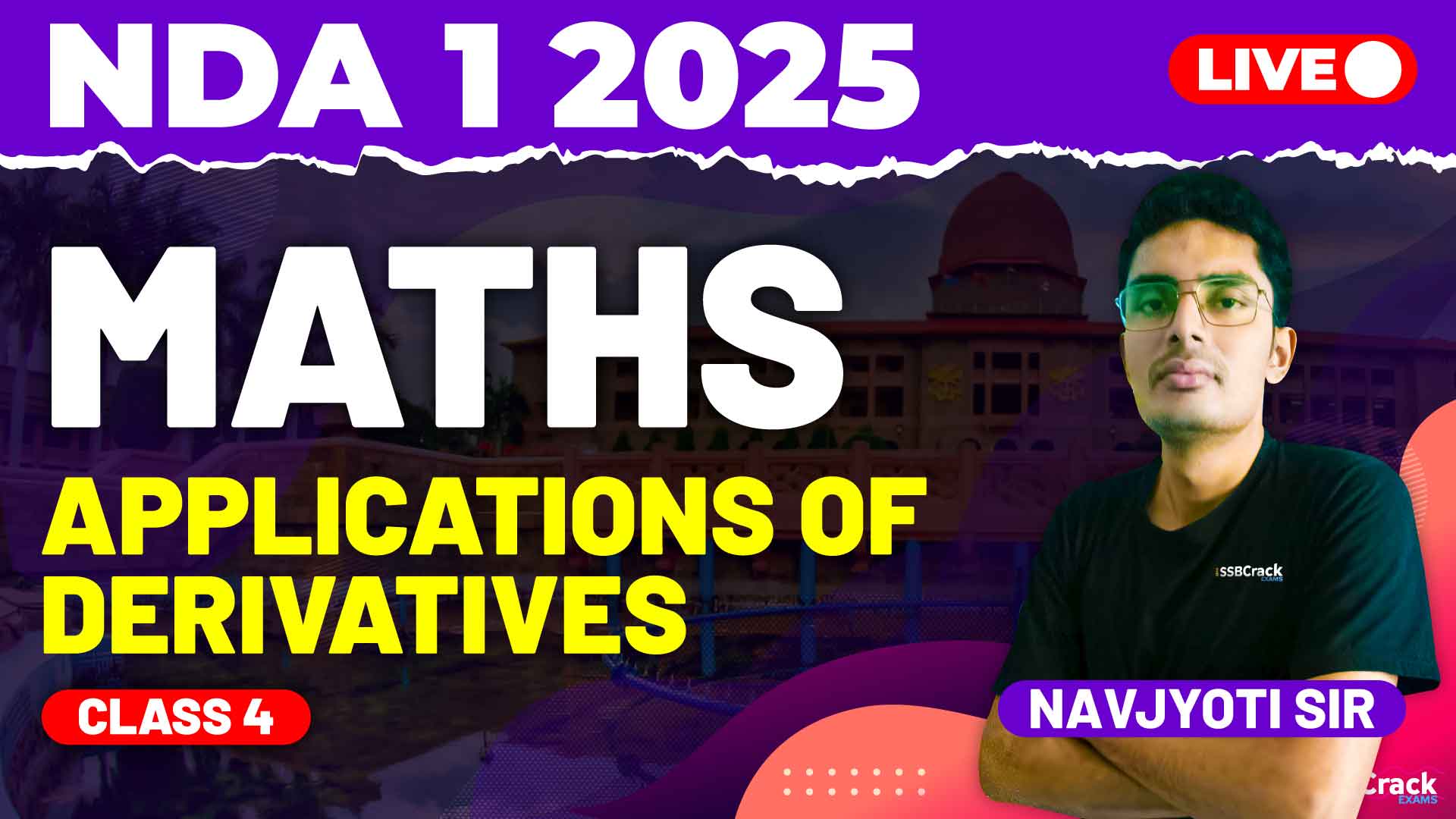A recent class conducted for the National Defence Academy and Naval Academy (NDA-NA) Exam – Paper I (Maths) focused on Applications of Derivatives. The session was dedicated to solving Multiple-Choice Questions (MCQs) from previous years and anticipated questions based on key subtopics like Rate of Change of Quantities, Tangent and Normal, Increasing and Decreasing Functions, Maxima and Minima, and related problem-solving techniques.
This session emphasized the importance of a practice-oriented approach to strengthen understanding, boost confidence, and refine time management skills for the upcoming examination.
Overview of the Class
1. MCQ-Based Learning
The core of the session revolved around practicing MCQs. Questions were carefully selected to ensure comprehensive coverage of all subtopics under the Applications of Derivatives. This included:
- Analyzing functions for increasing or decreasing behavior.
- Solving optimization problems to find maxima and minima.
- Understanding the geometric significance of derivatives in tangents and normals.
- Practical applications of rate of change in various scenarios.
2. Focus on Previous Year Questions
Previous year questions served as a foundation to familiarize students with the type and difficulty level of problems typically asked in the NDA-NA exam. This segment provided insights into frequently tested concepts and common traps to avoid.
3. Expected Questions for Better Preparation
The instructor introduced potential exam questions, challenging students to apply their conceptual knowledge in unfamiliar scenarios. This exercise prepared them for unexpected twists that might appear in the actual exam.
4. Step-by-Step Problem Solving
To ensure clarity, the instructor demonstrated a structured approach to solving problems, which included:
- Carefully reading and interpreting the question.
- Identifying the relevant subtopic or method.
- Simplifying the problem into smaller steps for accurate calculation.
5. Classroom Interaction and Peer Learning
The session encouraged active participation, with students sharing their solutions and discussing alternate methods. This collaborative environment helped resolve doubts and reinforced learning through discussion.
Key Takeaways from the Class
- Conceptual Clarity Is Crucial
A solid understanding of derivative applications is essential for solving MCQs quickly and accurately. Each question tested the students’ ability to apply theoretical knowledge in practical contexts. - Time Management Skills
The timed nature of the practice helped students learn to prioritize questions. Easier problems were tackled first, ensuring efficient utilization of time during the exam. - Common Mistakes Highlighted
Through feedback, the instructor pointed out typical errors, such as:
- Misinterpreting questions or functions.
- Incorrect identification of critical points for optimization problems.
- Careless calculation mistakes.
- Exam Pattern Familiarity
The session provided insights into the type, structure, and recurring themes in exam questions, helping students align their preparation accordingly.
Strategies to Prepare for Applications of Derivatives
1. Strengthen Your Basics
Before diving into MCQs, ensure you have a thorough understanding of the basic concepts of derivatives and their applications. This includes:
- Recognizing the significance of derivatives in real-world contexts.
- Understanding how to compute derivatives and interpret their results.
2. Focus on High-Yield Subtopics
Allocate more time to subtopics frequently tested in the exam:
- Rate of Change of Quantities: Practice interpreting problems in different contexts.
- Tangent and Normal: Work on deriving equations of tangents and normals at specific points.
- Increasing and Decreasing Functions: Understand how derivatives reveal the behavior of functions.
- Maxima and Minima: Master optimization techniques using both first and second derivative tests.
3. Solve MCQs Regularly
MCQ practice is the most effective way to prepare for this topic. Focus on:
- Previous year questions to identify common patterns.
- Mock tests to simulate the exam environment.
- Variations of questions to broaden your problem-solving abilities.
4. Learn from Mistakes
Review and analyze incorrect answers to understand your mistakes. This could involve misreading the question, applying the wrong method, or miscalculating values. Use these insights to avoid repeating errors.
5. Use Shortcuts Wisely
While speed is critical in MCQs, it’s essential to ensure accuracy. Practice mental calculations and shortcuts but avoid skipping necessary steps to prevent mistakes.
6. Incorporate Graphical Understanding
Visualizing functions through graphs can help you better understand their behavior. This is particularly useful for questions on increasing/decreasing functions and optimization.
7. Time Your Practice Sessions
Simulate exam conditions by setting a timer for practice sessions. This will help you improve speed and manage pressure during the actual exam.
8. Seek Guidance and Clarify Doubts
Engage in discussions with peers or instructors to resolve doubts. Sometimes, alternative approaches shared by others can simplify complex problems.
Conclusion
The recent class on Applications of Derivatives provided students with an invaluable opportunity to refine their problem-solving skills through focused MCQ practice. By revisiting fundamental concepts and applying them to a variety of exam-style questions, students gained the confidence to tackle even the most challenging problems in this topic.
To excel in the NDA-NA Maths exam, consistent practice, clarity in concepts, and familiarity with the exam pattern are essential. With dedication and a structured approach, mastering applications of derivatives becomes an achievable goal, opening the doors to a promising career in the defense forces.
Stay focused, practice diligently, and success will surely follow!







